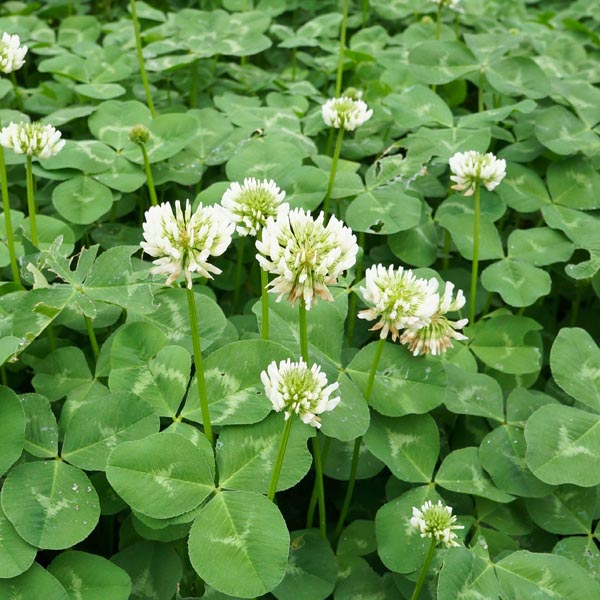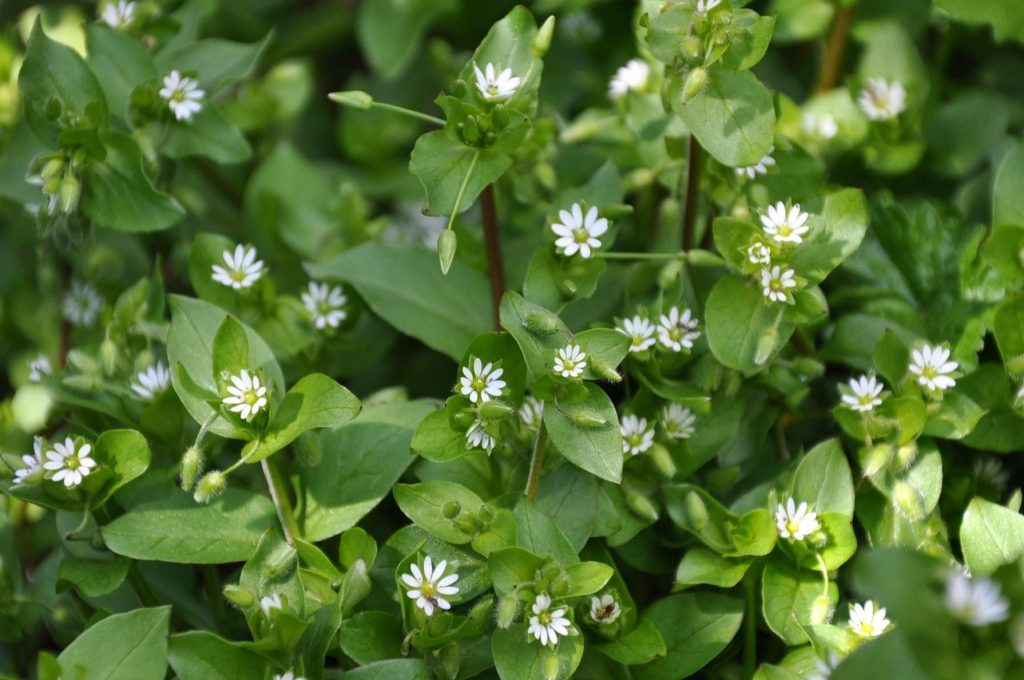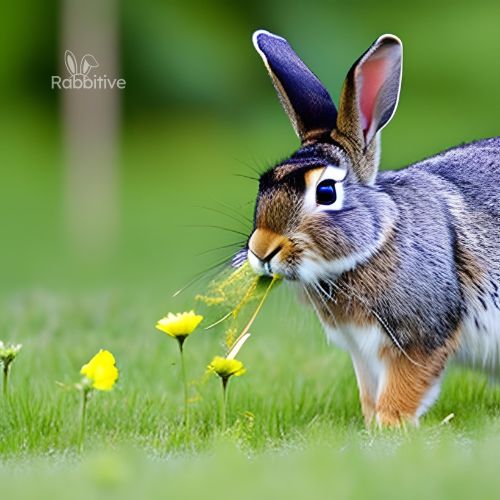Do you want to know if rabbits can eat weeds?
Weeds are often considered undesirable because they compete with cultivated crops for nutrients, water, and sunlight. They can be found in gardens, lawns, fields, and other areas with vegetation.
In this article, we will let you know if rabbits can eat weeds, which are safe and toxic for their consumption, and much more. We have also included pictures of the rabbit-safe weeds for easy identification.
Overview
Rabbits, by nature, are herbivores.
Their wild counterparts thrive on various greens, herbs, and plants that they find in their environment.
This diet is not just a matter of choice but a necessity.
The diverse range of plants they eat provides them with essential vitamins, minerals, and fibers necessary for their well-being.
Given their prevalence in wild settings, weeds naturally become a significant part of this dietary intake.
Can Rabbits Eat Weeds?
Yes, rabbits can eat certain weeds.
Weeds can be a nutritious addition to a rabbit’s diet, and many mimic the natural foods that rabbits eat in the wild.
However, it would be best if you differentiated between safe and unsafe weeds.
Before feeding any weed to a rabbit, correctly identify it as safe and ensure it’s fresh and clean.
While weeds can be an excellent dietary component, they should only be part of a balanced diet that includes hay, pellets, and fresh water.
Safe Weeds for Rabbits
Rabbits are natural foragers, and when given the opportunity, they’ll often nibble on various plants they encounter.
It’s a trait they’ve inherited from their wild ancestors, who depended on the wide plant in their environment to sustain themselves.
Given their abundance in many terrains, weeds comprise a significant part of their natural diet.
But as rabbit keepers, knowing which weeds are beneficial and which could harm our bunnies is vital.
1. Dandelions (Taraxacum officinale)
Dandelions are easily recognizable with their yellow flowers and serrated green leaves. In many gardens, they’re considered a persistent weed, but for rabbits, they’re a nutritious treat.
Benefits:
Dandelions are packed with essential vitamins, including A, C, and K. They also have calcium and potassium, which play crucial roles in bone health and muscle function. Moreover, the leaves are a good source of fiber.
Usage:
Rabbits can eat the whole plant, including flowers, leaves, and roots, but introduce it gradually to their diet to avoid digestive disruptions.
2. Clover (Trifolium)
Clovers have trifoliate leaves, often with a distinct white or pale green chevron pattern. Depending on the species, they produce ball-shaped flower clusters that can be white, pink, or red.
Benefits:
Clovers are rich in protein, making them an excellent dietary supplement. They also have an abundance of vitamins, such as vitamin C, and minerals that can contribute to a rabbit’s health.
Usage:
Rabbits can enjoy both the leaves and flowers. However, clover should be given in moderation due to its high protein content to avoid excessive weight gain.
3. Plantain (Plantago)
Not to be mixed up with the banana-like fruit, plantain weeds have broad or lance-shaped leaves that form a rosette pattern close to the ground. They produce a tall spike with tiny flowers when they bloom.
Benefits:
Plantains are a good source of both dietary fiber and vitamin C. The fiber aids digestion, helping prevent gastrointestinal issues, while vitamin C aids in several biological processes.
Usage:
The entire plant is safe for rabbits—leaves, flowers, and stems. It’s a particularly beneficial weed to include in their diet, especially for its digestive benefits.
4. Chickweed (Stellaria media)
Chickweed is a low-growing plant with small, white, star-shaped flowers. Its leaves are oval-shaped, growing opposite each other on delicate stems.
Benefits:
It’s rich in vitamins and minerals, especially vitamin C, calcium, and magnesium. These elements contribute to bone health, muscle function, and the general well-being of the rabbit.
Usage:
The whole chickweed plant can be fed to rabbits. Start with small portions and gradually increase if your rabbit likes it.
5. Nettle (Urtica dioica)
Nettles have a slightly serrated leaf edge and can cause a stinging sensation when touched. They grow tall and have tiny green or white flowers.
Benefits:
This weed is a powerhouse of nutrients. It contains vitamins A, C, and K, iron, magnesium, and other essential minerals.
Usage:
Before feeding nettles to rabbits, they should be blanched or dried to remove the stinging properties. Once prepared, they can be an invaluable addition to the diet.
Toxic Weeds For Rabbits
Some weeds can be nutritional powerhouses for rabbits, but others pose serious health threats.
As rabbit owners, ensuring their foraging doesn’t expose them to harmful plants is imperative.
Below is a detailed examination of common weeds that can be toxic or dangerous for rabbits and what symptoms might manifest if ingested.
1. Foxglove (Digitalis purpurea)
Foxgloves are tall plants with bell-shaped flowers that range from purple to pink. Their beauty makes them desirable to gardens, but their allure can be deceptive.
Dangers:
All parts of the foxglove plant are toxic. They contain cardiac glycosides, which directly affect heart function.
Symptoms:
If a rabbit consumes foxglove, it might exhibit signs like diarrhea, salivation, irregular heartbeats, and, in severe cases, cardiac failure.
2. Hemlock (Conium maculatum)
Hemlock is a tall plant with umbrella-like clusters of white flowers. Its stems are often spotted or streaked with purple.
Dangers:
Hemlock is one of the most poisonous plants found in many regions. Alkaloids present in the plant can cause paralysis and death.
Symptoms:
Early signs of hemlock ingestion include trembling, drooling, pupil dilation, and muscle weakness. Rapid intervention is vital as symptoms can escalate to respiratory failure.
3. Ragwort (Senecio jacobaea)
Ragwort is a tall weed with bright yellow, daisy-like flowers. While it might look innocuous, it’s hazardous for many animals, including rabbits.
Dangers:
This weed contains pyrrolizidine alkaloids that can cause liver damage over time when ingested.
Symptoms:
Ragwort poisoning symptoms can be subtle initially but might include appetite loss, lethargy, and digestive issues. As liver damage progresses, rabbits may develop jaundice and display neurological abnormalities.
4. Buttercup (Ranunculus)
Buttercups are low-growing plants that sport bright yellow, cup-shaped flowers. They are often found in gardens and wild meadows.
Dangers:
These plants contain ranunculin, which converts into the toxic substance protoanemonin when the plant is chewed or crushed.
Symptoms:
Ingesting buttercups can lead to drooling, pawing at the mouth, and digestive discomfort. In some cases, diarrhea and mild colic might ensue.
5. Bindweed (Convolvulus arvensis)
Bindweed is a climbing or creeping weed with funnel-shaped flowers, usually white or pink.
Dangers:
Bindweed can be harmful when consumed in large quantities. The exact toxins present are still debated, but the plant is known to be mildly toxic to many animals.
Symptoms:
Consumption might result in digestive distress, including diarrhea. In more severe cases, rabbits may become lethargic and show signs of discomfort.
Benefits of Weeds In a Rabbit’s Diet
The idea of feeding weeds to our beloved pets might, at first, seem counterintuitive.
Yet, nature, in its infinite wisdom, often packs the most nutrition in plants we commonly overlook or even dismiss.
When incorporated responsibly, many safe weeds can benefit a rabbit’s diet.
Here are the various advantages these weeds can provide.
1. Nutrient Density
Weeds, especially those that rabbits naturally gravitate towards, are nutrient powerhouses.
Their roots go deep into the soil, drawing up minerals and nutrients often inaccessible by shallow-rooted plants.
- Vitamins: Many weeds are a rich source of essential vitamins. For instance, dandelions are loaded with vitamins A, C, and K, while nettles offer an abundance of vitamins A and C. These vitamins are crucial to immune function, bone health, and well-being.
- Minerals: Weeds can be rich in minerals like calcium, potassium, and iron. For instance, plantains are known for their calcium content, vital for bone health, while nettles are rich in iron, supporting oxygen transport in the bloodstream.
2. Digestive Health
The dietary fiber in many weeds benefits a rabbit’s digestive system.
- High Fiber Content: Weeds like plantains are fibrous, which aids in digestion and helps maintain regular bowel movements. Regular consumption can reduce the risk of gastrointestinal stasis, a common and potentially lethal condition in rabbits.
- Digestive Enzymes: Some weeds can assist in breaking down food more efficiently, ensuring optimal nutrient absorption and promoting gut health.
3. Natural Dental Care
Rabbits have continuously growing teeth.
Chewing on fibrous weeds can naturally help grind down their teeth, preventing overgrowth and associated dental problems.
4. Immune System Boost
Certain weeds offer antioxidants and compounds that can enhance a rabbit’s immune response, making them less susceptible to diseases.
- Antioxidants: These compounds combat oxidative stress in the body. Weeds like dandelions contain beta-carotene, a potent antioxidant that can protect cells from damage.
- Anti-inflammatory Properties: Some weeds possess natural anti-inflammatory properties. For example, plantains have been used traditionally to reduce inflammation, which can benefit a rabbit.
5. Behavioral Enrichment
Introducing various weeds into a rabbit’s diet can also serve as a behavioral enrichment.
Foraging and exploring different textures and tastes can mentally stimulate rabbits, keeping them engaged and content.
6. Natural Hydration
Many weeds have a high water content, which can contribute to a rabbit’s hydration, especially during warmer months.
Adequate hydration is essential for kidney function and overall health.
How to Introduce Weeds to Your Rabbit’s Diet
Introducing any new food into your rabbit’s diet requires care and observation.
Many weeds offer many benefits, but sudden dietary changes can upset a rabbit’s sensitive digestive system.
Here’s a detailed guide on how to incorporate weeds into your rabbit’s meals safely and effectively.
1. Research and Identification
Before introducing any weed, it’s paramount to identify it accurately. Misidentification can lead to accidentally feeding your rabbit a toxic plant.
- Field Guides: Use reliable field guides or apps dedicated to local plant identification.
- Expert Consultation: Consider seeking guidance from local botanical gardens, universities, or experts who can help identify plants.
2. Source Responsibly
Ensure the weeds you’re collecting haven’t been exposed to harmful chemicals, pesticides, or pollution.
- Avoid Roadside Collection: Plants near roads can absorb pollutants from vehicle emissions.
- Garden Collection: If collecting from your garden, ensure it’s chemical-free, and no toxic plants are growing nearby.
3. Start Slowly
When introducing a new weed, begin with a small amount to monitor how your rabbit reacts to it.
- One at a Time: Introduce one type of weed at a time. This way, if there’s any adverse reaction, it’s easier to pinpoint the cause.
4. Monitor for Reactions
Watch your rabbit closely after they’ve consumed a new weed. Any signs of distress should be noted, and if they occur, stop feeding that particular weed immediately.
- Signs to Watch: Look out for digestive discomfort, changes in droppings, excessive drooling, or any other unusual behaviors.
5. Gradually Increase Quantity
If your rabbit enjoys the new weed and shows no distress, you can slowly increase the amount you offer.
- Mix with Familiar Foods: Mix the new weed with foods your rabbit is already accustomed to. This can make the introduction smoother and more acceptable to them.
6. Maintain Variety
It’s great if your rabbit likes a particular weed, but you should offer a variety of safe weeds over time.
This ensures they get a range of nutrients and don’t overconsume any particular compound.
7. Store Appropriately
If you’re collecting larger quantities of weeds, ensure they’re stored correctly to maintain freshness.
- Refrigeration: Freshly picked weeds can be kept in the refrigerator for a few days in a produce bag.
- Drying: Some weeds can be dried and stored for extended periods. This is particularly useful for weeds like nettles, which must be dried to eliminate their stinging properties.
8. Observe Dental Health
One of the benefits of fibrous weeds is their ability to assist in natural dental care for rabbits.
Watch your rabbit’s chewing habits and ensure their teeth aren’t overgrowing.
9. Regularly Update Diet
As seasons change, different weeds will become available.
Continuously update your rabbit’s diet to include these seasonal varieties, ensuring they get a wide range of nutrients throughout the year.
Pictures Of Weeds Rabbits Can Eat





Conclusion
Feeding weeds to rabbits can be a healthy addition to their diet, but it comes with the responsibility of ensuring their safety.
By staying informed about which weeds are beneficial and which are toxic, you can provide a varied and nutritious diet for your bunnies.
We hope this article helped you know if rabbits can eat weeds. If you have any questions, comment below, and we will answer them.


